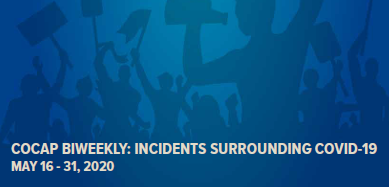Incident Reports
Stigma-free life is what we want: Survivors: Kathmandupost Report
2016-07-10
As the government prepares to amend current policies and guidelines on the reintegration of victims of human trafficking, survivors have called on the authorities concerned to focus on providing better skills and create the environment to ensure that they can lead a stigma-free life.
Existing policies focus more on the reintegration of women with their families. But trafficking survivors say it has always been difficult for them to get reintegrated into society.
“They (survivors) have never been accepted and almost all survivors we have talked to have said they would prefer to start afresh in a new place rather than going back to the family or the same village or society where they fear stigma and discrimination,” said Renu Rajbhandari, president of Women Rehabilitation Centre (Worec).
Chari Maya Tamang, who herself is a trafficking survivor, echoes Rajbhandari.
She said she would not have been able to achieve what she has in life had she been forced to get integrated into the same village or society she hails from. Tamang from Sindhupalchok was rescued from India and is the founder of Shakti Samuha, which was awarded Ramon Magsaysay Award in 2013 for its outstanding work in saving and protecting women and children from trafficking. She was also honoured with the 2011 Hero Acting to End Modern-Day Slavery Award in 2011. Besides calling on the authorities to ensure training of different kinds, apart from conventional tailoring, the survivors have also laid stress on developing a mechanism so that the products they make after skill training could reach the market.
“Tailoring skills will no longer work as readymade garments are cheaply available in the market. Those making handicrafts have no idea how to get their goods to the market. We hope the new policy does not abandon survivors after providing skill training,” said Tamang.
According to Tamang, young women are more interested to receive training on computer and information technology, as chances of employment are higher.
A research conducted by Shakti Samuha and Women Rehabilitation Centre had revealed that trafficking survivors were keen on becoming economically independent. They had also expressed
their desire to complete
formal education.
They also stressed the need to carry out awareness programmes to change the perception among people about the trafficking survivors.
A list of suggestions, including a new concept of reintegration, new skill training and a massive focus on employment opportunity, was also handed over to the Ministry of Women, Children and Social Welfare, which
is currently amending
guideline.
National/Online Media
Related Reports
Human Trafficking / Kabhrepalanchok
Two arrested on the charge of human trafficking in Kavrepalanchok
Bagmati, Kabhrepalanchok, Banepa
May 22, 2023
Human Trafficking / Kabhrepalanchok
29-year-old man arrested on the charge of human trafficking
Bagmati, Kabhrepalanchok, Banepa, Ward 8
May 22, 2023
Human Trafficking / Dhading
Complaint lodged against a woman arrested on the charge of human trafficking in Dhading
May 14, 2023
GBV / Rautahat
Seven arrested on the charge of operating sex-trafficking hotel in Rautahat
May 03, 2023
GBV / Lalitpur
14-year-old teen boy arrested on the charge of raping a 5-year-old girl in Lalitpur; Accused's father arrested on the charge of trafficking the victim to India
April 28, 2023
Related Trend Analysis
Analysis

THE NEPAL PEACE MONITOR ANNUAL REVIEW: 2020
October 25, 2021
Human Trafficking / LGBT+ Rights / GBV / Political / Children’s Rights / Senior Citizens’ Rights / HRD Issues / Human Rights / Interpersonal Violence / Governance / Covid-19 / Civic-Space / PwD


